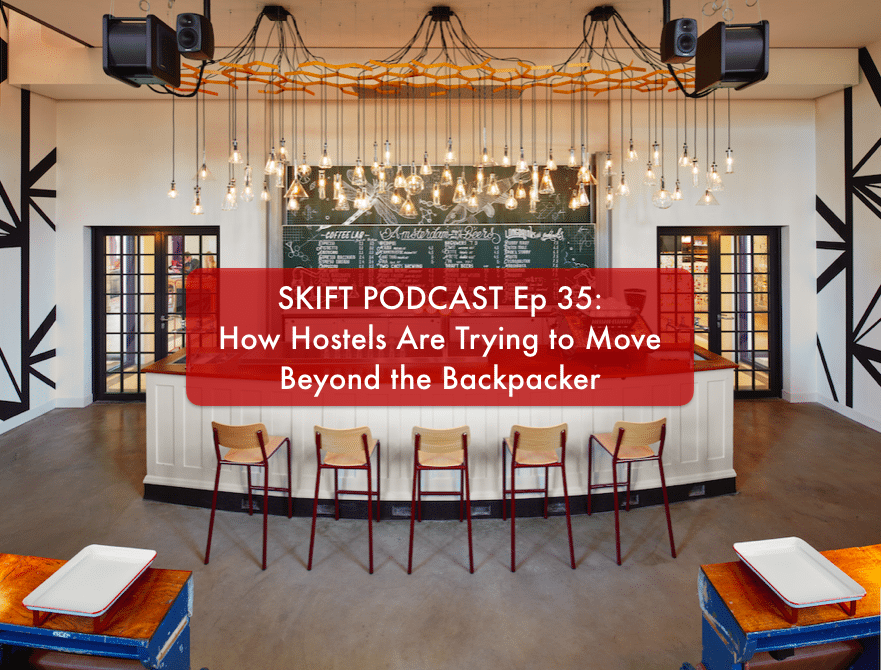Skift Take
Hostels are no longer the dirty, questionable haunt of teenage backpackers. They've grown up quite a bit, along with their demographic.
We looked at contemporary hostels for a recent episode of the Skift Podcast, in which we explored how hostels are evolving and upgrading to focus on design, a local vibe, and the kind of buzz that attracts even non-guests.
Our guest was Fredrik Korallus, CEO of London-based Generator Hostels, joined by Skift podcast host Hannah Sampson and co-host Greg Oates.
The CEOs of Carnival, Expedia, Peek, and More Are Speaking at Skift Global Forum 2016. Join Us.
Here are five takeaways from the conversation:
The modern hostel guest wants a shared local experience.
There are increasingly fewer amenities in the rooms because the shared space is the crux of the modern hostel. In these common areas, guests have curated local art, design, music, cocktails, and food, and most importantly, the environment encourages people to socialize throughout the day.
“It’s definitely a very extroverted society,” Korallus said. “We really let our guests and our local community steer the way the day goes. Obviously we transition [from breakfast] into a lunch, and then in the afternoon the bars activate. In the evening the music activates and then the clubs activate and it just rolls on.”
He said the properties need to cater to locals with food and beverage outlets in part because hostel guests want to be surrounded by locals.
“Our bars and restaurants are actually designed to serve the local community,” he said. “We really must bring in the local community because our traveler is looking for local engagement.”
Airbnb isn’t necessarily a threat to modern hostels.
Traditional hotels may feel threatened by Airbnb’s low pricing and lifestyle brand, but many hostels operate in a different corner of the market. Generator focuses on a shared experience with many people, while Airbnb doesn’t really stress socialization.
“Airbnb is individualistic. You buy a fabulous space, an apartment, a house, a palace, and the only thing that’s shared is the fact that you’re in the shared economy,” Korallus said. “Who knows? [Airbnb] may evolve their model and enter our space, but today no. I actually view them as a potential partner.”
Older travelers are now taking hostels seriously.
The era when hostels were exclusively for teenage backpackers on a shoestring is coming to a close.
“For sure we have a lot of empty nesters,” Korallus said. “They might stay with us and go out to a three-Michelin-star restaurant while they stay with us and blow 500 pounds on a meal, but have 50 pounds on a bed. These are the smart savvy people who consider the accommodation side to be the least important part of their journey.”
Hostels may start to permeate the American hospitality market.
The U.S. enjoys more spacious real estate than many countries in Europe, and as a result, many Americans might be more accustomed to having their own private spaces rather than sharing. Some markets call for more shared accommodation than private, and vice versa. The upcoming Generator in Miami Beach, for example, will open with about half of the rooms shared and half private.
“When we do open in Miami, I envision over time that we’ll introduce more shared accommodation. I should believe that the notion of that lifestyle experience is going to take off very well in the U.S., but we’re starting slightly cautiously,” said Korallus.
American youth is apparently Generator’s fastest growing segment.
Business travelers are increasingly staying at hostels.
Hostel pricing is good for any company’s bottom line when they’re sending an employee on the road. In terms of hostels hosting meetings and events, hostels tend to attract creative industries that already match the hostel’s lifestyle brand, i.e. frequently not bankers.
“We get business travelers who seek out the experience and obviously the affordability. As long as they fit in, everyone is welcome. People sort of tend to select in or out of the hostel-shared-economy-type experience. You need to be very sociable.”
Start listening to The Skift Podcast, today. Subscribe via iTunes, Soundcloud or RSS.
Have a confidential tip for Skift? Get in touch
Tags: generator, generator hostels, hostels
